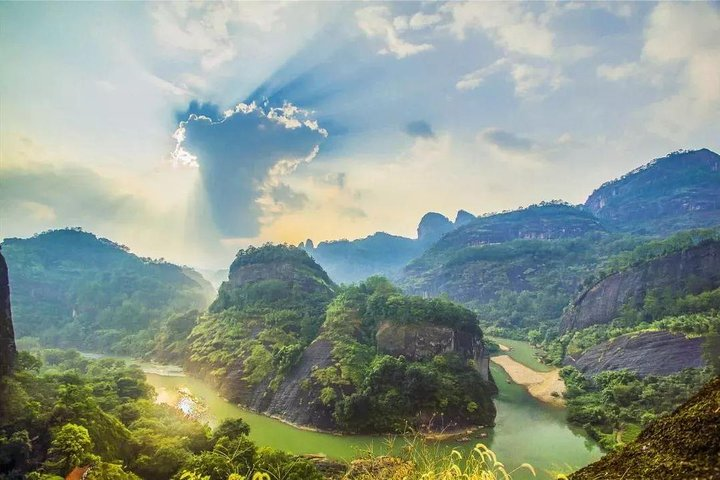
proofdaily.com – Mount Wuyi, located in Fujian Province, China, is a stunning natural wonder known for its breathtaking landscapes and rich cultural heritage. As a UNESCO World Heritage Site, it encompasses both scenic beauty and historical significance, making it a must-visit destination for nature enthusiasts and history buffs alike.
Geological and Ecological Features
Landscape and Scenery
Mount Wuyi is renowned for its dramatic landscapes, featuring towering peaks, lush forests, winding rivers, and unique rock formations. The area is dominated by the Nine-Bend River, which snakes through the mountains, offering picturesque vistas and opportunities for bamboo rafting. The natural beauty of Mount Wuyi is complemented by its serene atmosphere, providing a tranquil escape from the hustle and bustle of city life.
Biodiversity and Conservation
As a biodiversity hotspot, Mount Wuyi is home to a wide range of flora and fauna. The region boasts over 2,500 plant species, including rare and endemic varieties, as well as diverse wildlife such as the Chinese giant salamander and the clouded leopard. Conservation efforts have been implemented to protect this rich ecosystem, ensuring the preservation of its unique biodiversity for future generations.
Cultural and Historical Significance
Ancient Human Activities
Mount Wuyi has been inhabited for thousands of years, with evidence of human activity dating back to the Neolithic period. The region is dotted with archaeological sites, including ancient city ruins and cliffside dwellings, which provide insights into the lives of early settlers.
Taoism and Buddhism
The cultural landscape of Mount Wuyi is deeply intertwined with Taoist and Buddhist traditions. The area is home to several temples and monasteries, such as the Tianxin Yongle Temple and the Wuyi Palace. These sacred sites have been centers of religious practice and pilgrimage for centuries, reflecting the spiritual significance of the mountain.
Tea Culture and the Wuyi Rock Tea
One of Mount Wuyi’s most famous exports is its renowned Wuyi Rock Tea, a type of oolong tea grown on the mountain’s rocky terrain. The unique climate and soil conditions impart a distinctive flavor to the tea, making it highly prized among connoisseurs. The cultivation and production of Wuyi Rock Tea are deeply rooted in the region’s history, and visiting the tea plantations offers a glimpse into this traditional craft.
Modern-Day Attractions and Activities
Hiking and Exploration
Mount Wuyi offers numerous trails and paths for hiking enthusiasts, ranging from leisurely walks to challenging climbs. Exploring these trails allows visitors to experience the mountain’s diverse landscapes and discover hidden gems along the way.
Cultural Experiences
In addition to its natural beauty, Mount Wuyi provides opportunities for cultural immersion. Visitors can engage in traditional tea ceremonies, explore ancient temples, and learn about the area’s rich history and customs through guided tours and local events.
Conclusion
Mount Wuyi stands as a testament to the harmonious coexistence of nature and culture. Its stunning landscapes, rich biodiversity, and deep historical roots make it a captivating destination for those seeking both adventure and enlightenment. As we journey through this remarkable region, we are reminded of the enduring beauty and significance of Mount Wuyi in the tapestry of Chinese heritage.







